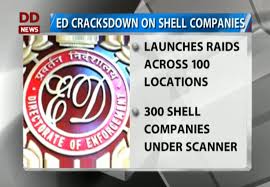 After successfully completing over 1,000 scrutiny I-T assessments under a maiden taxpayer-friendly paperless inquiry system, CBDT is set to extend the initiative as it is mulling seeking taxpayers’ consent to opt for the scheme at ITR filing stage itself.
After successfully completing over 1,000 scrutiny I-T assessments under a maiden taxpayer-friendly paperless inquiry system, CBDT is set to extend the initiative as it is mulling seeking taxpayers’ consent to opt for the scheme at ITR filing stage itself.
Central Board of Direct Taxes (CBDT), the policy-making body of the Income Tax department, had launched a pilot project last year to reduce taxpayers’ visit to the tax office and their interface with the taxman.
Under the project, the first set of e-communications were decided to be mailed to the assessees in DELHI, Mumbai, Bengaluru, Ahmedabad and Chennai region.
As per official data accessed by PTI, the department in these five cities has completed scrutiny assessments in 1,001 cases till now, after a total of 6,481 assesses were contacted of which 1,812 responded positively.
A senior official said the biggest “challenge” in achieving better success in this new project was obtaining the consent of the taxpayers.
The Assessing Officers (AOs) found that while in some cases the taxpayer could not be reached as their personal email ids were with their CAs or authorised representatives, in a few other cases the assessee withdrew his consent to join the scheme, the official said.
“It is now being mulled if the I-T department can print a footnote on the Income Tax Return (ITR) or on the scrutiny notice itself that the taxpayer is invited to participate in the exercise over email in a paperless manner.
“The results are encouraging and the CBDT wants to make this an institutional system for scrutiny assessments henceforth,” the official said, adding the scheme is expected to be widened and rolled out with new features within this financial year.
The success of the project, initiated last year, is evident from the fact that CBDT recently added two more cities (Hyderabad and Kolkata), to the existing five metros, under the paperless assessment system exercise.
With this project, CBDT aims to end corruption and bring hassle-free experience for the taxpayers who undergo a time-consuming scrutiny assessment procedure which entails production of a number of documents and financial statements.
The department, however, says it brings only about 1 per cent of cases under the said procedure.
An official notification had been issued earlier which spells out the procedure, formats and standards for ensuring “secured transmission” of emails between the AO and the assessee stating all communication between the two sides will be done in PDF file format and over bonafide email ids.
This followed an amendment in the I-T Act in December last year, which allowed emails to become the new mode of interaction between the AO and the tax-paying individual.
Under the new procedure, the taxman will send emails, for issuing notices and summons, through the government registered ‘@incometax.gov.in’ email domain and the attached PDF document will have his or her designation and signature.
In response to such I-T notice, taxpayers will have to submit the details called for, in a Portable Document Format (PDF) through their email id registered with the department.
The notification states, “Any email, in response to the notice issued by the AO, received from the primary email address of the assessee, shall be considered as a valid response to the notice.”
In the same notification, CBDT had also mandated that the taxman will maintain an audit trail of all e-communication with a taxpayer in the IT department’s central database for future reference and as record management of the entire transaction.
The new directives also allow a taxpayer to physically submit a reply to such e-notices in case of a technical problem in their email. “This shall be treated as adequate compliance,” it had said.
The project was launched after CBDT had asked the I-T department to “initiate the concept of using emails for corresponding with taxpayers and sending through emails the questionnaire, notice etc at the time of scrutiny proceedings and getting responses from them”.
“This would eliminate the necessity of visiting the Income Tax offices by the taxpayers, particularly in smaller cases, involving limited issues and where taxpayer is able to provide details required by the AO without necessitating his physical presence,” the order had said.
Source : http://economictimes.indiatimes.com/articleshow/53061801.cms






